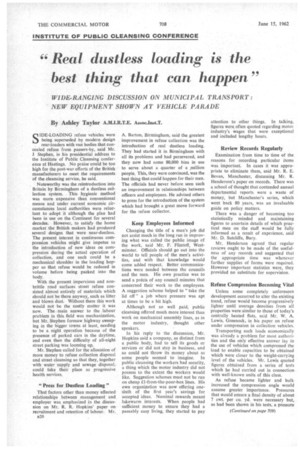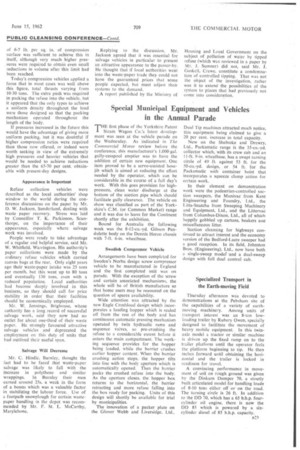"Real dustless loading is the best thing that can happen"
Page 54

Page 57

If you've noticed an error in this article please click here to report it so we can fix it.
WIDE-RANGING DISCUSSION ON MUNICIPAL TRANSPORT: NEW EQUIPMENT SHOWN AT VEHICLE PARADE
By Ashley Taylor A.M.I.R.T.E. Assoe.Inst.T.
SIDE-LOADING refuse vehicles were being superseded by modern design rear-loaders with van bodies that concealed refuse from passers-by, said Mr. J. Stephen, in his presidential address to the institute of Public Cleansing conference at Hastings. No praise could be too high for the post-war efforts of the British manufacturers to meet the requirements of the cleansing service, he said.
Noteworthy was the reintroduction into Britain by Birmingham of a dustless collection system. This hygienic method was more expensive than conventional means and under current economic circumstances local authorities were reluctant to adopt it although the plan had been in use on the Continent for several decades. However, to satisfy the home market the British makers had produced several designs that were near-dustless. The present interest in continuous compression vehicles might give impetus to the introduction of new ideas on compression during the actual operation of collection, and one such could be a mechanical shredder in the loading hopper so that refuse would be reduced in volume before being packed into the body.
With the present impervious and nonbrittle road surfaces street refuse consisted almost entirely of materials which should not be there anyway, such as litter and blown dust. Without them this work would not be the costly matter it was now. The main answer to the labour problem in this field was mechanization, but Mr. Stephen foresaw highway sweeping in the bigger towns at least, needing to be a night operation because of the presence of parked cars in the daytime, and even then the difficulty of ail-night street parking was looming up.
Mr. Stephen called for the allocation of more money to refuse collection disposal and street cleansing so that they, together with water supply and sewage disposal, could take their place as progressive health services.
"Press for Dustless Loading" That factors other than money affected relationships between management and employer was emphasized in the discussion on Mr. it. R. Hopkins' paper onrecruitment and retention of labour. Mr..
B20
A. Barton, Birmingham, said the greatest improvement in refuse collection was the introduction of real dustless loading. They had started it in Birmingham with all its problems and had persevered, and they now had some 80,000 bins in use to serve about a quarter of a million people. This, they were convinced, was the best thing that could happen for their men. The officials had never before seen such an improvement in relationships between officers and employees. He advised others to press for the introduction of the system which had brought a great move forward for the refuse collector.
Keep Employees Informed Changing the title of a man's job did not assist much in the long run in improving what was called the public image of the work, said Mr, F. Flintoff, Westminster. Officials should go out into the world to tell people of the men's activities, and with that knowledge would come added respect. Better communications were needed between the councils and the men. His own practice was to send a precis of any council minutes that concerned their work to the employees. A suggestion scheme helped to 'take the lid off" a job where pressure was apt at times to be a bit high.
Although not so well paid, public cleansing offered much more interest than work on mechanical assembly lines, as in the motor industry, thought other speakers.
In his reply to the discussion, Mr. Hopkins said a company, as distinct from a public body, had to sell its goods or services or did not stay in business, and so could not throw its money about as some people seemed to imagine. In public cleansing the workers had security, a thing which the motor industry did not possess to the extent the workers would like. Suggestion schemes must not be run on cheap fl-from-the-poor-box lines. His own organization was now offering onesixth of the first year's savings for accepted ideas. Nominal rewards meant lukewarm interests. When people had sufficient money to ensure they had a passably easy living, they started to pay
attention to other things. In talking, figures were often quoted regarding motor industry's wages that were exceptional and included lengthy hours.
Review Records Regularly Examination from time to time of the reasons for recording particular items was important. In cases it was appropriate to eliminate them, said Mr. R. E. Bevan, Manchester, discussing Mr. R. Henderson's paper on records. There was a school of thought that contended annual departmental reports were a waste of money, but Manchester's series, which went back 80 years, was an invaluable guide on policy matters.
There was a danger of becoming too statistically minded and maintaining figures to ascertain details of which practical men on the staff would be fully informed as a result of experience, said Mr. D. Sutcliffe, Bury.
Mr. Henderson agreed that regular reviews ought to be made of the usefulness of any records and suggested that the appropriate time was whenever further supplies of forms were required. However important statistics were, they provided no substitute for supervision.
Refuse Compression Becoming Vital
Unless some completely unforeseen development occurred to alter the existing trend, refuse would become progressively lighter until average densities from all properties were similar to those of today's centrally heated flats, said Mr. W. A. Lewis, Greenock, in his paper on refuse under compression in collection vehicles.
Transporting such loads economically was already a problem for most authorities and the only effective answer lay in the use of vehicles which compressed the load to enable capacities to be obtained which were closer to the weight-carrying level of the vehicles. Mr. Lewis quoted figures obtained from a series of tests which he had carried out in connection with well-known units of this class.
As refuse became lighter and bulk increased the compression angle would assume greater importance. Pressures that would erisure a final density of about 7 cwt. per cu. yd. were necessary but, as had been shown in his tests, a pressure.
of 6-7 lb. per sq. in. of compression surface was sufficient to achieve this in itself, although very muchhigher pressures were required to obtain even small reductions in volume after this limit had been reached.
Today's compression vehicles applied a force that in most cases was well above this figure, total thrusts varying from 10-30 tons. The extra push was required in packing the refuse into the vehicle, but it appeared that the only types to achieve a uniform density throughout the load were those designed so that the packing mechanism operated throughout the length of the body.
If pressures increased in the future this would have the advantage of giving more uniform packing, but it was doubtful if higher compression ratios were required than those now offered, or indeed were worth seeking in view of the extremely high pressures and heavier vehicles that would be needed to achieve reductions greater than the 65-70 per cent. obtainable with present-day designs.
Appearance is Important Refuse collection vehicles were described as the local authorities' shop window to the world during the conference discussions on the paper by Mr. D. W. Jackson, Sunderland, dealing with waste paper recovery. Stress was laid by Councillor T. K. Parkinson, Scunthorpe, on the importance of their appearance, especially where salvage work was involved.
People were ready to take advantage of a regular and helpful service, said Mr. W. Whitfield, Warrington. His authority's paper collections were made by the ordinary refuse vehicles which carried canvas bags at the rear. Only eight years ago their waste-paper intake was 25 tons per month, hut this went up to 80 tons and eventually 130 tons, even with a reduced population. Local authorities had become deeply involved in this business, so they should call for price stability in order that their facilities should be economically employed.
Mr. W. Jennings, Brighouse, whose authority has a long record of successful salvage work, said they now had no outlet for about one-third of their waste paper. He strongly favoured attractive salvage vehicles and deprecated the employment on this duty of units that had outlived their useful span.
Salvage Will Decrease Mr. C. Hindle, Burnley, thought the fact had to be faced that waste-paper salvage was likely to fall with the increase in polythene and similar wrappings. In Burnley their men earned around 25s. a week in the form of a bonus which was a valuable factor in stabilizing the labour force. Use of a footpath snowplough for certain wastepaper handling in the depot was recommended by Mr. F. St. L. McCarthy, Marylebone. Replying to the discussion, Mr. Jackson agreed that it was essential for salvage vehicles in particular to present an attractive appearance to the passer-by, He thought that if local authorities went into the waste-paper trade they could not have the guaranteed prices that some people expected, but must adjust their systems to the demand.
A report published by the Ministry of Housing and Local Government on the subject of pollution of water by tipped refuse (which was reviewed in a paper by Mr. J. Sumner) did not, said Mr. J. Gaskell, Crewe, constitute a condemnation of controlled tipping. That was not the object of the investigation, rather was it to extend the possibilities of the system to places that had previously not come into consideration.




















































































































